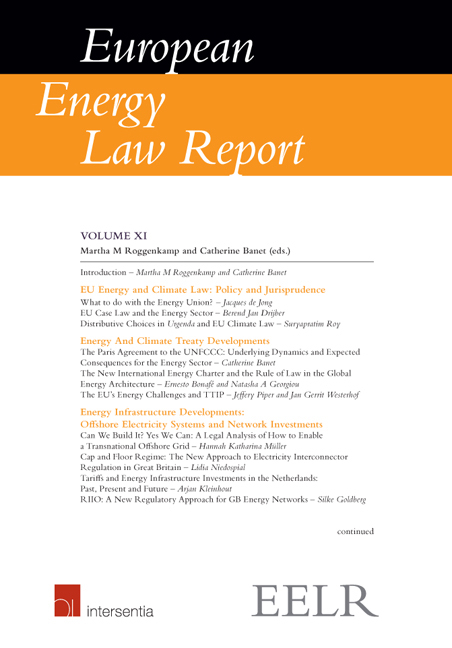Book contents
- Frontmatter
- Editorial
- Contents
- List of Abbreviations
- List of Contributors
- Introduction
- Part I EU Energy and Climate Law: Policy and Jurisprudence
- Part II Energy and Climate Treaty Developments
- Part III Energy Infrastructure Developments: Offshore Electricity Systems and Network Investments
- Part IV Heat Supply Legislation in the Eu
- Chapter XI District Heating Regulation in Sweden
- Chapter XII Heat Supply in Denmark: Any Lessons to Be Learned?
- Chapter XIII The Heat is On: Developments in the Regulation of the Heat Market in the Netherlands
- Part V Security of Energy Supply and Safety
Chapter XII - Heat Supply in Denmark: Any Lessons to Be Learned?
from Part IV - Heat Supply Legislation in the Eu
Published online by Cambridge University Press: 29 September 2018
- Frontmatter
- Editorial
- Contents
- List of Abbreviations
- List of Contributors
- Introduction
- Part I EU Energy and Climate Law: Policy and Jurisprudence
- Part II Energy and Climate Treaty Developments
- Part III Energy Infrastructure Developments: Offshore Electricity Systems and Network Investments
- Part IV Heat Supply Legislation in the Eu
- Chapter XI District Heating Regulation in Sweden
- Chapter XII Heat Supply in Denmark: Any Lessons to Be Learned?
- Chapter XIII The Heat is On: Developments in the Regulation of the Heat Market in the Netherlands
- Part V Security of Energy Supply and Safety
Summary
BACKGROUND AND CONTEXT
It all began with the oil crisis in 1973–74.
It may sound like the beginning of a fairy tale, but it was neither a happy beginning nor fantasy. Two countries in the world were almost totally (99 per cent) dependent on imported fuels to cover their energy needs. These were Japan and Denmark. The oil embargo and the massive increases in oil prices therefore had serious effects on Denmark and on Danish society, including an economic decline due to the then energy dependent growth model. These events became the trigger for change. The energy sector could not be left solely to the market, rather the State had to intervene and it has done so ever since.
The developments are well-illustrated by the following energy policy statement from March 1979:
The Danish energy system has up-till now … been market based … predictions about a future shortage in oil has led to a desire for an overarching public control of important parts of the energy sector.
In seeking to resolve these problems and establish more independence from external sources and increase flexibility, the Government and the industry undertook a series of comprehensive decisions and actions implying a development ranging from no intervention over increasing State influence with focus on first security of supply considerations solely to a much higher focus on sustainable development of the energy sector. Even though fuel shortages and power cuts rarely happen in the Western world, and Denmark has an electricity security of supply at 99.99 per cent, we are repeatedly reminded about how dependent society is on reliable and secure energy supplies and how energy failures are inflicting widespread damage on local economies.
Danish energy policy has developed remarkably over the years and implied several energy transitions. The first one followed the oil crises of the 1970s where the supply pattern changed from 100 per cent oil imports to coal supplies that had to be imported as well but with a much more varied supply pattern (eg from Poland, South Africa and South America). A second phase was subsequently based on indigenous production of natural resources.
- Type
- Chapter
- Information
- European Energy Law Report XI , pp. 239 - 256Publisher: IntersentiaPrint publication year: 2017



